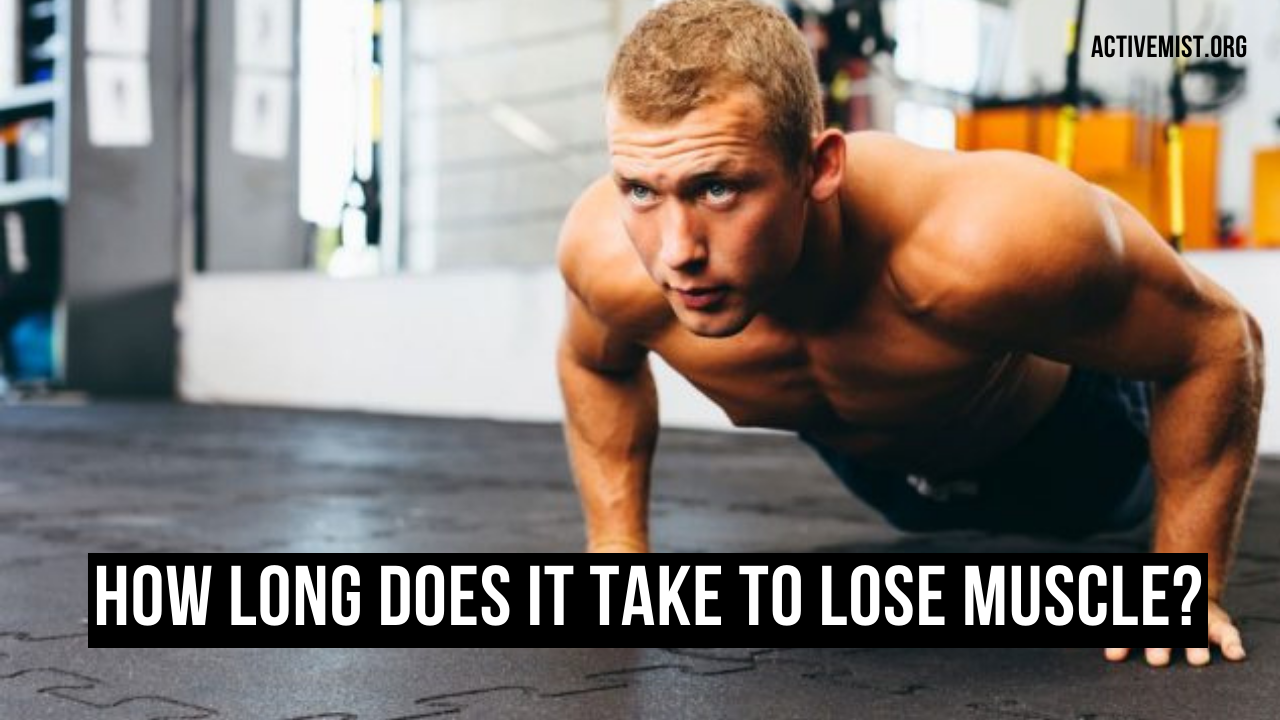
HOW LONG DOES IT TAKE TO LOSE MUSCLE?(Best Guidance)
HOW LONG DOES IT TAKE TO LOSE MUSCLE? Unlike belly fat, which never seems to go away, it’s often assumed that if you don’t use your muscle mass, you’ll lose it. While that’s partly true, it’s a little more complicated than that.
Whether you’ve just recovered from an injury or a long break from the gym, you’re probably wondering how much your recovery period has hurt your gains. So here’s everything we know about lean tissue maintenance.

Can you lose muscle?
Ultimately, you can lose any bodyweight, including fluid, adipose tissue, and muscle, especially if you cut calories. However, your body tends to burn fat rather than muscle when it needs energy.
And they boost our metabolism, which is why your body wants to keep it up for as long as possible. Unlike fat, which requires a calorie deficit to break down, muscle loss can be achieved through inactivity alone, through muscle atrophy.
This can also occur naturally with age and due to malnutrition or incredibly low protein intake.
How quickly muscle atrophy?
Occurs depends on your current fitness level and the amount of time you have been inactive.
The more muscle mass you have, the harder it is to maintain inactivity, and the more you may lose. People are likely to lose muscle mass faster than people who are not fit.
Some research suggests that you can start shedding muscle after as little as a week of inactivity. Another study suggests that your muscle size can decrease by about 11 times after ten days without exercise.
Even if you are not bedridden, don’t panic. There’s no need to regret every vacation or week you’ve taken.
It’s important to understand that true muscle atrophy usually occurs around times of injury or when you’ve stopped using your muscles completely for an extended period immobilizing your leg for two weeks or more is different than taking a few weeks off weightlifting to pause.
Also, decreasing muscle size doesn’t always mean fat loss. It could be dehydration. When you take a break from training, water loss and glycogen depletion can cause your muscles to shrink by up to 20% in a week.
Learning so much love is directly related to this, and your glycogen and water stores can come back up pretty quickly once you start exercising again.
Does muscle become fat?
Muscle and fat are two completely different cell types and often require different diets and methods to increase or decrease them. The longer you take a break, the more your body composition begins to change.
Fat cells can expand, making you feel less toned, but that doesn’t mean your muscle will turn to fat, especially if you eat the right amount. However, if you consume more calories than you need, you will gain fat along with your muscle loss.
A body composition test is the easiest way to tell if you’re losing muscle. Also, keep an eye on your strength, measurements, and weight to indicate possible muscle loss. Build muscle again? If you stop exercising and muscle atrophy sets in, it’s entirely possible to regain what you’ve lost.
Thanks to muscle memory, it can happen faster than it took to build that muscle the first time. There is no exact answer to how quickly this can happen.
Some research suggests it takes three times as long to regain muscle mass as it would if you were completely immobilized. But that amount of time can depend on the person and whether or not they’ve used their muscles at all.
If you can’t make it to the gym and are worried about losing muscle mass or regaining muscle mass you’ve already lost, here are three surefire ways to protect your lean tissue:
Maintain your calorie intake
Weight loss of any kind is caused by cutting down Caloric intake from overeating during inactivity can lead to excess fat gain. Muscle Lifting weights can help build muscle strength, but it’s unnecessary to build muscle.
All you have to do is use it consistently. This includes strength training or resistance training (bodyweight movements, exercises). And bands etc.), even just a few times a week, can help protect your muscle mass.
Eat lots of protein Muscle is made up of protein, and when your body isn’t getting enough protein from your diet, your muscles are one of the first places to eat.
The body will steal protein to meet its nutritional needs. Therefore, it is important to pay attention to a protein-rich diet. Research even suggests that higher protein intake may help maintain energy.
Must Read:








